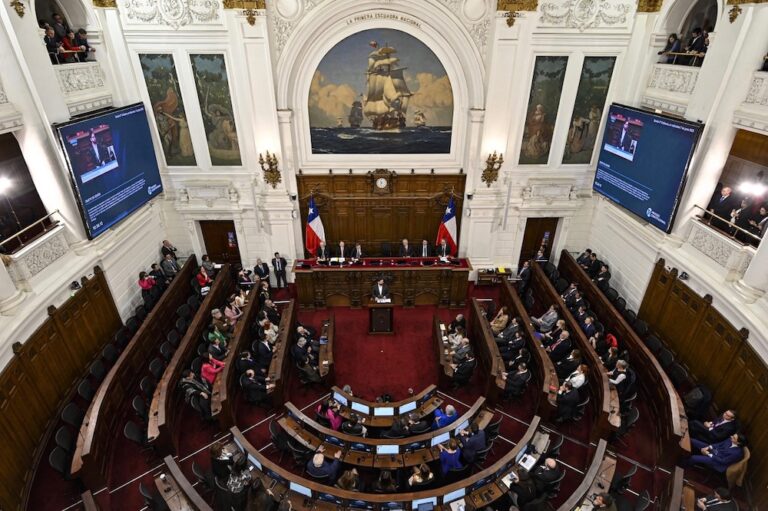(WPFC/IFEX) – The following is a 19 July 2002 WPFC press release: Chilean Leaders Support Scrapping ‘Insult’ Laws Leading Chilean lawmakers, jurists and journalists promised this week to support a bill eliminating anachronistic desacato laws that provide criminal penalties for “insulting the honor or dignity” of public officials. The pledges were made in Santiago and […]
(WPFC/IFEX) – The following is a 19 July 2002 WPFC press release:
Chilean Leaders Support Scrapping ‘Insult’ Laws
Leading Chilean lawmakers, jurists and journalists promised this week to support a bill eliminating anachronistic desacato laws that provide criminal penalties for “insulting the honor or dignity” of public officials.
The pledges were made in Santiago and Valparaiso to World Press Freedom Committee Executive Director Marilyn Greene and Projects Coordinator Javier Sierra during a July 14-17 visit in which they met with a wide range of public officials and journalists, including Mario Garrido Montt, chief justice of the Supreme Court, and top lawmakers in both houses of legislature.
They urged elimination of desacato provisions contained in Articles 263, 264 and 265 of the country’s Criminal Code and in Article 284 of the Code of Military Justice.
Officials said they are prepared to renounce the special immunity from critical comment provided by such laws.
“I am totally convinced that in a democracy it is incumbent on us to accept criticism,” said Deputy Víctor Barrueto, author of Chamber of Deputies Bill No. 292907, which calls for elimination of desacato statutes in order to “leave behind legislation belonging to authoritarian countries, whose governments seem to look suspiciously and despondently at their citizens’ contribution to the public debate.”
Meanwhile, Chilean President Ricardo Lagos has pledged to introduce similar legislation. Such a bill, coming from the president’s office, would proceed on a “fast track” basis through Chile’s Chamber of Deputies and Senate.
“Clearly, desacato provisions are outdated, undemocratic and unneeded in Chile or any other country,” Greene said. “Elimination of these laws should occur without further delay.”
Desacato laws — remnants of a colonial era in which the ruling monarch was immune to criticism — have been denounced as undemocratic by international rights organizations, including the Inter-American Commission on Human Rights, which in its 1995 annual report called for their elimination. The Commission declared that desacato laws are incompatible with Article 13 of the American Convention on Human Rights, and called for their elimination.
Press freedom rapporteurs for the Organization of American States (OAS), the Organization for Security and Cooperation in Europe (OSCE) and the UN Human Rights Commission have also called repeatedly for their elimination.
To date, however, only three Latin American nations — Argentina, Paraguay and Costa Rica — have eliminated desacato provisions. At least 13 other countries in the region, including Chile, still have such laws in effect.
The most recent application of Chile’s desacato laws was against TV commentator Eduardo Yanez, accused of insulting the Supreme Court during a panel discussion on Chilevision’s talk show, El Termometro, in which he called Chile’s justice system “immoral, cowardly and corrupt.”
Yanez, who is free on bail but cannot leave the country without official permission, could face an extended jail term and a fine, according to Article 263 of Chile’s Criminal Code.
“I want to be the last Chilean to go to jail for expressing his opinions,” says Yanez, whose case is supported by WPFC.
Justice Garrido, whose court ordered Yanez’s detention, told WPFC that the Court has no choice but to enforce desacato provisions as long as such laws are on the statute books, but said that he fully supports elimination of such laws.
The World Press Freedom Committee has been working for more than 5 years to encourage elimination of desacato laws, arguing that such laws should be eliminated because:
* Adequate civil laws already exist to address the concerns and complaints of citizens who feel they have been defamed;
* Public officials deserve less – not more – protection from public scrutiny than do ordinary citizens;
* Democracy and economic prosperity are not possible without public accountability of leaders, transparency in transactions and vigorous public discussion of issues;
* Press freedom cannot be said to exist in a nation where journalists can be jailed for their work, or citizens for their comments on public actions and officials’ performances;
* Full participation in the international political and economic community is not possible as long as a nation fails to abide by the principles of democracy and good governance accepted by that community.
In a global study of more than 90 countries, WPFC found that such laws exist on every continent. While they are infrequently used in democracies such as Chile, the mere fact of their continuing existence lends justification to authoritarians in less developed nations, who use insult laws routinely to stifle scrutiny and criticism.
“It is incumbent upon democracies such as Chile to eliminate such laws and to assert strong leadership for those nations looking to them as examples,” Greene said.
Following a 2001 visit to Costa Rica, where a WPFC delegation urged then-President Miguel Angel Rodriguez, supreme court justices, journalists and lawmakers to repeal that country’s desacato laws, Costa Rica eliminated desacato provisions from its statute books, earning wide praise from WPFC, the Inter-American Commission on Human Rights and other press freedom and human rights groups.
Greene predicted that Chile, too, will receive wide acclaim for demonstrating the foresight and courage to dispense with special protections and privileges for public officials. “In committing themselves to eliminating desacato provisions, Chile’s leaders demonstrate their continuing determination to strengthen democracy here and throughout the region,” Greene said.
She noted that Chile last year eliminated Article 6(b) of its State Security law, under which investigative journalist Alejandra Matus was prosecuted following publication of her expose, The Black Book of Chilean Justice. Matus fled to exile in the US, returning only after elimination of the law and the lifting of an official ban on her book.
Greene and Sierra applauded Chilean lawmakers for recent press law reforms, and for scrapping statutes providing for prior censorship of films such as the controversial “Last Temptation of Christ.”
Elimination of desacato provisions, Greene said, “is the next logical step in this positive process.”
The World Press Freedom Committee, with headquarters in Reston, Va., USA, is a global coordination group that includes 44 free-press organizations on six continents. The WPFC is dedicated to a full and free flow of news everywhere.


